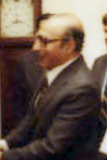Agha Shahi | |
|---|---|
| آغا شا ﮨی | |
 | |
| 13th Minister of Foreign Affairs | |
| In office 14 January 1978 – 9 March 1982 | |
| President | General Zia-ul-Haq |
| Preceded by | Aziz Ahmed |
| Succeeded by | Lt Gen Yaqob Ali Khan |
| 13th Secretary of Foreign Affairs | |
| In office 6 July 1973 – 6 July 1977 | |
| President | Fazal Ilahi Chaudhry |
| Prime Minister | Zulfiqar Ali Bhutto |
| Preceded by | Mumtaz Ali Alvie |
| Succeeded by | Sardar Shah Nawaz |
| Permanent Representative of Pakistan to the United Nations | |
| In office 25 March 1967 – 20 January 1972 | |
| President | Field Marshal Ayub Khan General Yahya Khan Zulfiqar Ali Bhutto |
| Vice President | Nurul Amin |
| Vice PM | Nurul Amin |
| Preceded by | Syed Amjad Ali |
| Succeeded by | Iqbal Akhuond |
| Personal details | |
| Born | Agha Shahi 25 August 1920 Bangalore, Princely State of Mysore, British India |
| Died | 6 September 2006 (aged 86) Islamabad, Pakistan |
| Citizenship | British Indian (1920–1947) Pakistan (1947–2006) |
| Nationality | Pakistani |
| Relatives | Agha Hilaly (brother) Zafar Hilaly (nephew) |
| Alma mater | Indian Institute of Science |
| Occupation | Statesman |
| Profession | Physicist, mathematician, teacher |
| Cabinet | Zia military government Zulfiqar Ali Bhutto Government |
| National Awards | Nishan-e-Imtiaz, 2nd Class (Order of Excellence) |
Agha Shahi (Urdu: آغا شا ﮨی; 25 August 1920 – 6 September 2006), NI, was a Pakistani career Foreign service officer who was the leading civilian figure in the military government of former President General Zia-ul-Haq from 1977 to 1982. A diplomat and technocrat by profession, he joined Foreign Services in 1951 and held important diplomatic assignments in the United States, China, and the United Nations. He served as the Foreign secretary— the leading bureaucratic position in Pakistan Government— in 1973 until 1977, after Zulfikar Ali Bhutto's government was dismissed (see Codename Fair Play).[1]
However, he immediately served as the foreign policy adviser to upcoming Chief Martial Law Administrator General Zia-ul-Haq who appointed him as the Foreign Minister shortly after assuming the control of the country. In 1982, after losing General Zia's favour when he made an attempt to keep country on Non-Aligned Movement membership, he lost the foreign affairs ministry to senior military officer Lieutenant-General Yakob Ali Khan. His relationship with General Zia-ul-Haq and his military government further deteriorated, with General Zia complaining about Shahi's speech on improving Pakistan's relations with Soviet Union and the Non-Aligned Movement. He departed from country in 1982 to join the United Nations General Assembly and served as the Chairman of UN Committee on Elimination of Racial Discrimination until 1990, and served as the Chairman of the Pakistan delegation at World Conference on Human Rights. During his last years, he associated with the Institute of Strategic Studies (ISS), Islamabad where he served as its president until his death.[1]